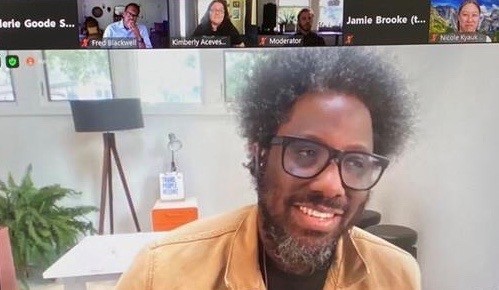Thank you for joining us for our first donor dialogue on race in America and the Bay Area held on August 24, 2020. I hope you’re inspired to join us on this journey to discover what it means to become more aware, engage, and take action around our own racial identities and how we show up as philanthropists. This is no easy task. Thank you for grappling with us to discover how we can create a more equitable Bay Area.
W. Kamau Bell, Kimberly Aceves-Iñiguez, and Fred Blackwell shared a powerful call to action for this moment: begin with an inward journey to identify the privileges we hold and activate them to fight white supremacy. In addition, challenge ourselves to listen to community members and move resources to support their solutions. Please consider supporting organizations listed in our Racial Justice Give Guide by recommending grants through your donor advised fund. Now is the time to mobilize your charitable resources.
Stay tuned for details on our next donor dialogue, which will be held in September, discussing how race factors into political representation – a timely and pertinent conversation for election season.
In Solidarity,
Ruben Orduña, Chief of Philanthropy, San Francisco Foundation
Conversation Highlights
Our goal in holding this series of donor dialogues is to create a space for donors to reflect and do the deeply personal work of examining their racial identities and what those identities call them to do as philanthropists in this moment of reckoning in our society. We heard from Kamau and Kimberly that NOW is the time to do this work, and they challenged us to trace the roots of the wealth we hold and question whether giving—if it is going to liberate people who are structurally oppressed—can still feel comfortable for donors, or if it will need to feel uncomfortable because it is aimed at upending systems which have made it possible to accumulate that wealth.
We heard that our current system of ingrained white supremacy, which shows up in a few overt and many covert ways, impacts our BIPOC (Black, Indigenous, and People Of Color) communities first and worst, but that in perpetuating the system, we are all losing out. And, we were encouraged not just to fund the solutions to problems, but also to fund the celebration, joy, culture, and love that produces healing in those communities, which is necessary to sustain this transformative work.
Fred encouraged us to think at a policy and systems level in funding this work, and to double-down, getting comfortable with the uncomfortableness of discussing race, which we were grateful to see already starting to happen in our small group conversations. We’re excited to continue and deepen these conversations in our next session.
Check out the Resources section below for ideas for continuing to engage with these topics until our next conversation.
Resources
We invite you to check out a few resources offered by our donor dialogue speakers and foundation staff to go deeper and continue working with the material offered in the conversation.
- “RYSE Up” music video by youth from RYSE Center, which kicked off our session
- Recap by W. Kamau Bell of how white supremacy shows up in our culture
- “The Promise of the Bay”: a performance by poet Chinaka Hodge. An Oakland native, Hodge shines a light on what equity would mean to the Bay Area, and how all of us can contribute to this vision of a region where everyone thrives.
- “White Privilege: Unpacking the Invisible Knapsack”: this short piece is an approachable introduction to the concept of examining privilege.
- Scene on Radio Podcast: Seeing White: this audio series offers a chance to deeply explore the history of how white privilege and white supremacy were structured into American society.
- “5 Practices to Advance Equity with Your Giving:” we offer five equity-based practices that donors can use to ground their giving and create real-world impact.
- SFF is here for you: reach out to our philanthropic advisors for partnership in navigating how to approach your giving. Reach out to them directly or via donorservices[at]sff.org.


